英语虚拟语气
(完整版)英语虚拟语气语法归纳总结
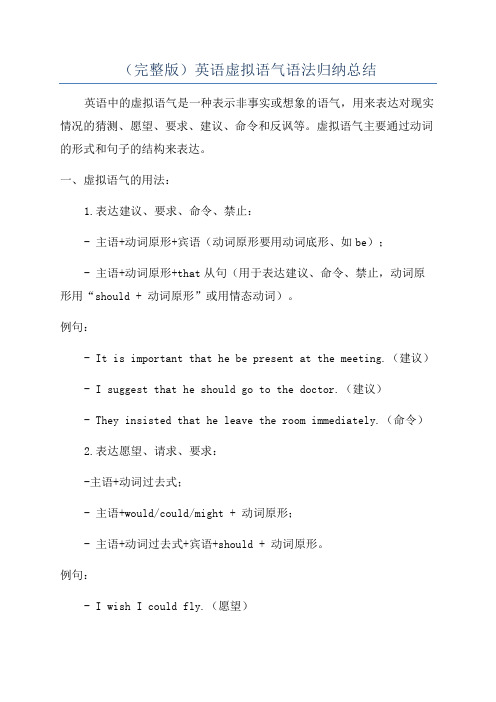
(完整版)英语虚拟语气语法归纳总结英语中的虚拟语气是一种表示非事实或想象的语气,用来表达对现实情况的猜测、愿望、要求、建议、命令和反讽等。
虚拟语气主要通过动词的形式和句子的结构来表达。
一、虚拟语气的用法:1.表达建议、要求、命令、禁止:- 主语+动词原形+宾语(动词原形要用动词底形、如be);- 主语+动词原形+that从句(用于表达建议、命令、禁止,动词原形用“should + 动词原形”或用情态动词)。
例句:- It is important that he be present at the meeting.(建议)- I suggest that he should go to the doctor.(建议)- They insisted that he leave the room immediately.(命令)2.表达愿望、请求、要求:-主语+动词过去式;- 主语+would/could/might + 动词原形;- 主语+动词过去式+宾语+should + 动词原形。
例句:- I wish I could fly.(愿望)- I would appreciate it if you could help me.(请求)3.表示虚拟条件:- If条件从句中的谓语动词用过去完成时,主句用would/should/might/could + have + 过去分词;- If条件从句中的谓语动词用过去时,主句用would/should/could + 动词原形。
例句:- If I had known his phone number, I would have called him.(虚拟条件)- If you had listened to me, we could have finished the project earlier.(虚拟条件)4.表达建议、要求、祝愿:- If only内部称述 + 主语 + 过去式。
英语中三种虚拟语气
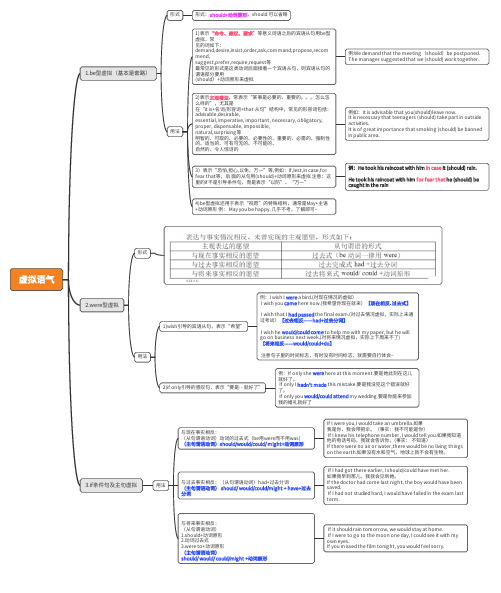
虚拟语⽓1.b e型虚拟(基本是套路)2.w ere型虚拟3.if条件句及主句虚拟形式⽤法⽤法1)表⽰“命令、建议、要求”等意义词语之后的宾语从句⽤b e型虚拟,常⻅的词如下:d e m an d,d es i re,i ns i s t,or d er,as k,co mm an d,p ro p ose,reco mm en d,sugges t,p re f er,re q u i re,re q ues t等最常⻅的形式是这类动词后⾯接着一个宾语从句,则宾语从句的谓语部分要⽤(s h oul d)+动词原形来虚拟2)表⽰主观看法,常表⽰“某事是必要的、重要的。
怎么怎么样的”,尤其是在“it i s+名词/形容词+th a t 从句”结构中,常⻅的形容词包括:a dvi sab le,d es i ra b le,essen ti al, imp era tiv e, imp or t an t, necessar y, o b l i ga t or y,p ro p er, di s p ensa b le, imp oss ib le,na t ural,sur p r i s i ng等明智的、可取的、必要的、必要性的、重要的、必需的、强制性的、适当的、可有可⽆的、不可能的、⾃然的、令⼈惊讶的3)表⽰“恐怕,担⼼,以免,万一”等,例如:if,les t,i n case,f orf ear th a t等,后 ⾯的从句⽤(s h oul d)+动词原形来虚拟 注意:这⾥的if不是引导条件句,⽽是表⽰“以防”、“万一”4)b e型虚拟还⽤于表⽰“祝愿”的特殊结构,通常是M a y+主语+动词原形 例: M a y y ou b e h a ppy. ⼏乎不考,了解即可~与现在事实相反:(从句谓语动词)动词的过去式(b e⽤w ere⽽不⽤w as)(主句谓语动词)s h oul d/w oul d/coul d/ mi g ht+动词原形与过去事实相反:(从句谓语动词)h a d+过去分词(主句谓语动词) s h oul d/ w oul d/coul d/mi g ht + h a v e+过去分词与将来事实相反:(从句谓语动词)1.s h oul d+动词原形2.动词过去式3.w ere t o+动词原形(主句谓语动词)s h oul d/ w oul d/ coul d/mi g ht +动词原形形式:s h oul d+动词原形,s h oul d 可以省略If it s h oul d ra i n t o m orro w, w e w oul d s t a y a t h o m e.If I w ere t o go t o th e m oon one d a y, I coul d see it with myo w n e y es.If y ou mi sse d th e fi l m t on i g ht, y ou w oul d f eel sorr y.If I h a d go t th ere earl i er, I s h oul d/coul d h a v e m e t h er.如果我早到那⼉,我就会⻅到她。
英语虚拟语气知识点

英语虚拟语气知识点(经典版)编制人:__________________审核人:__________________审批人:__________________编制单位:__________________编制时间:____年____月____日序言下载提示:该文档是本店铺精心编制而成的,希望大家下载后,能够帮助大家解决实际问题。
文档下载后可定制修改,请根据实际需要进行调整和使用,谢谢!并且,本店铺为大家提供各种类型的经典范文,如演讲稿、总结报告、合同协议、方案大全、工作计划、学习计划、条据书信、致辞讲话、教学资料、作文大全、其他范文等等,想了解不同范文格式和写法,敬请关注!Download tips: This document is carefully compiled by this editor. I hope that after you download it, it can help you solve practical problems. The document can be customized and modified after downloading, please adjust and use it according to actual needs, thank you!In addition, this shop provides you with various types of classic sample essays, such as speech drafts, summary reports, contract agreements, project plans, work plans, study plans, letter letters, speeches, teaching materials, essays, other sample essays, etc. Want to know the format and writing of different sample essays, so stay tuned!英语虚拟语气知识点虚拟语气一般指说话人的主观愿望或假想,是与客观存在相反的事实,或在现实中无法成真的事情或情形。
英语语法虚拟语气整理
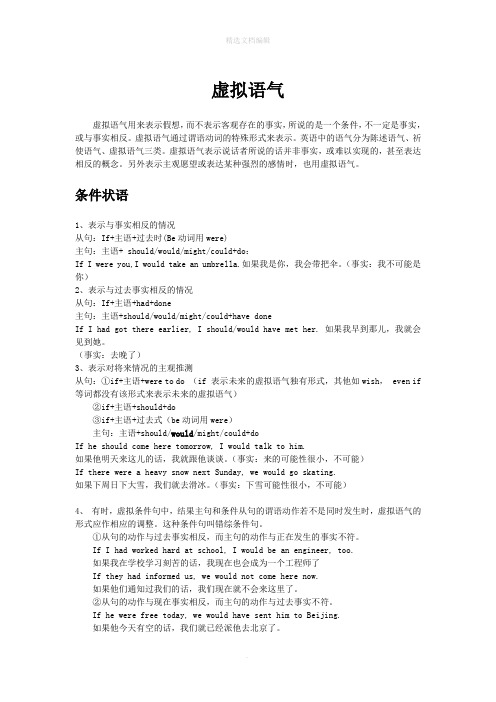
虚拟语气虚拟语气用来表示假想,而不表示客观存在的事实,所说的是一个条件,不一定是事实,或与事实相反。
虚拟语气通过谓语动词的特殊形式来表示。
英语中的语气分为陈述语气、祈使语气、虚拟语气三类。
虚拟语气表示说话者所说的话并非事实,或难以实现的,甚至表达相反的概念。
另外表示主观愿望或表达某种强烈的感情时,也用虚拟语气。
条件状语1、表示与事实相反的情况从句:If+主语+过去时(Be动词用were)主句:主语+ should/would/might/could+do:If I were you,I would take an umbrella.如果我是你,我会带把伞。
(事实:我不可能是你)2、表示与过去事实相反的情况从句:If+主语+had+done主句:主语+should/would/might/could+have doneIf I had got there earlier, I should/would have met her. 如果我早到那儿,我就会见到她。
(事实:去晚了)3、表示对将来情况的主观推测从句:①if+主语+were to do (if 表示未来的虚拟语气独有形式,其他如wish, even if 等词都没有该形式来表示未来的虚拟语气)②if+主语+should+do③if+主语+过去式(be动词用were)主句:主语+should/would/might/could+doIf he should come here tomorrow, I would talk to him.如果他明天来这儿的话,我就跟他谈谈。
(事实:来的可能性很小,不可能)If there were a heavy snow next Sunday, we would go skating.如果下周日下大雪,我们就去滑冰。
(事实:下雪可能性很小,不可能)4、有时,虚拟条件句中,结果主句和条件从句的谓语动作若不是同时发生时,虚拟语气的形式应作相应的调整。
英语虚拟语气的三种时态
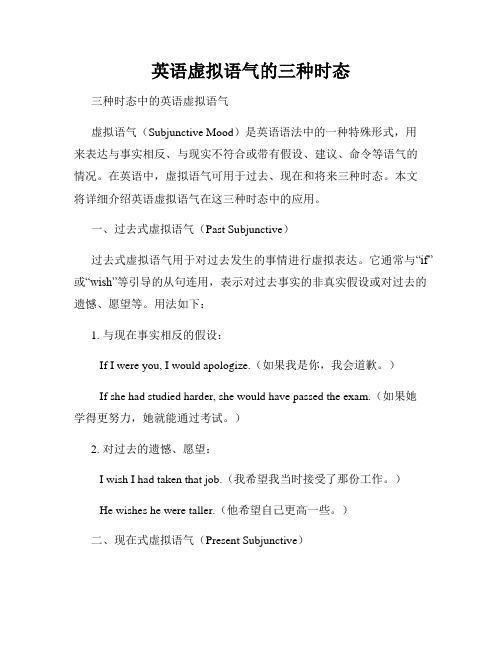
英语虚拟语气的三种时态三种时态中的英语虚拟语气虚拟语气(Subjunctive Mood)是英语语法中的一种特殊形式,用来表达与事实相反、与现实不符合或带有假设、建议、命令等语气的情况。
在英语中,虚拟语气可用于过去、现在和将来三种时态。
本文将详细介绍英语虚拟语气在这三种时态中的应用。
一、过去式虚拟语气(Past Subjunctive)过去式虚拟语气用于对过去发生的事情进行虚拟表达。
它通常与“if”或“wish”等引导的从句连用,表示对过去事实的非真实假设或对过去的遗憾、愿望等。
用法如下:1. 与现在事实相反的假设:If I were you, I would apologize.(如果我是你,我会道歉。
)If she had studied harder, she would have passed the exam.(如果她学得更努力,她就能通过考试。
)2. 对过去的遗憾、愿望:I wish I had taken that job.(我希望我当时接受了那份工作。
)He wishes he were taller.(他希望自己更高一些。
)二、现在式虚拟语气(Present Subjunctive)现在式虚拟语气用于对现在或将来的事情进行虚拟表达。
它通常与“if”或“suggest”等引导的从句连用,表示对现实的非真实假设、建议或要求。
用法如下:1. 对现在事实相反的假设:If it were to rain, we would stay at home.(如果下雨的话,我们将呆在家里。
)I suggest that he be more careful.(我建议他更加小心。
)2. 对现在的建议或要求:It is important that she arrive on time.(她准时到达是很重要的。
) They demanded that he pay the bill immediately.(他们要求他立即支付账单。
英语虚拟语气

英语虚拟语气摘要:一、英语虚拟语气的概念与分类1.定义2.分类二、英语虚拟语气的用法1.表示与现在事实相反的假设2.表示与过去事实相反的假设3.表示对未来事实的虚拟4.表示愿望、建议、命令等三、虚拟语气在各种从句中的应用1.名词性从句2.状语从句3.定语从句四、虚拟语气与其他语气的区别1.与条件语气的区别2.与推测语气的区别五、虚拟语气的注意事项1.形式的变化2.语气的转换3.语境的理解正文:一、英语虚拟语气的概念与分类1.定义英语虚拟语气(Subjunctive Mood)是一种表示说话者对某个动作或情况的真实性、可能性或期望的语气。
它用于表示与事实相反的假设、愿望、建议等。
2.分类根据用途和时态,英语虚拟语气可分为三类:(1)与现在事实相反的虚拟语气,如:If I were you,I would accept the job.(2)与过去事实相反的虚拟语气,如:If he had known the truth,he would have helped me.(3)表示对未来事实的虚拟,如:If it rains tomorrow,we will stay at home.二、英语虚拟语气的用法1.表示与现在事实相反的假设虚拟语气用于表示与现在事实相反的假设,如:If I were you,I would accept the job.2.表示与过去事实相反的假设虚拟语气用于表示与过去事实相反的假设,如:If he had known the truth,he would have helped me.3.表示对未来事实的虚拟虚拟语气用于表示对未来事实的虚拟,如:If it rains tomorrow,we will stay at home.4.表示愿望、建议、命令等虚拟语气可用于表示愿望、建议、命令等,如:I wish he would come to our party.三、虚拟语气在各种从句中的应用1.名词性从句在名词性从句中,如主语从句、宾语从句和表语从句,可以使用虚拟语气,如:What if I tell you that we can succeed?2.状语从句在表示条件、原因、目的等状语从句中,可以使用虚拟语气,如:If I were you,I would accept the job.3.定语从句在定语从句中,如用虚拟语气修饰的名词性从句,如:The man who would win the competition was my brother.四、虚拟语气与其他语气的区别1.与条件语气的区别虚拟语气与条件语气都表示假设,但虚拟语气更注重对事实的虚拟,而条件语气关注条件与结果之间的关系。
英语中虚拟语气用法总结
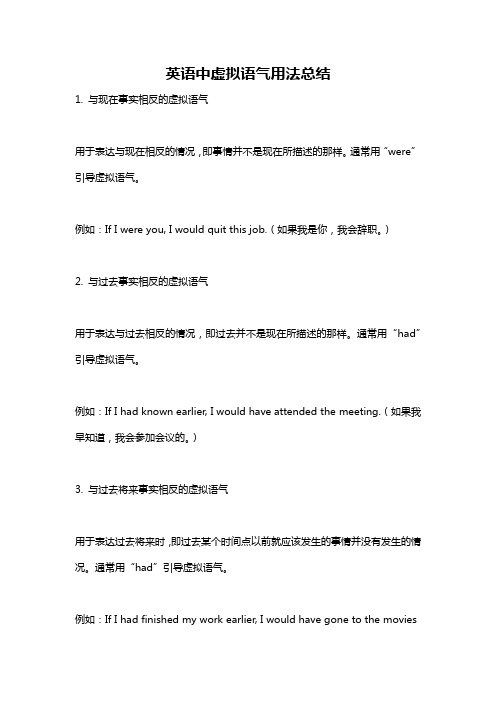
英语中虚拟语气用法总结1. 与现在事实相反的虚拟语气用于表达与现在相反的情况,即事情并不是现在所描述的那样。
通常用“were”引导虚拟语气。
例如:If I were you, I would quit this job.(如果我是你,我会辞职。
)2. 与过去事实相反的虚拟语气用于表达与过去相反的情况,即过去并不是现在所描述的那样。
通常用“had”引导虚拟语气。
例如:If I had known earlier, I would have attended the meeting.(如果我早知道,我会参加会议的。
)3. 与过去将来事实相反的虚拟语气用于表达过去将来时,即过去某个时间点以前就应该发生的事情并没有发生的情况。
通常用“had”引导虚拟语气。
例如:If I had finished my work earlier, I would have gone to the movieswith my friends.(如果我早点完成工作,我会和朋友去看电影的。
)4. 与现在将来可能性相反的虚拟语气用于表达现在将来的可能性,即可能会发生但不太可能的情况。
通常用“should”或“were to”引导虚拟语气。
例如:If I were to win the lottery, I would travel around the world.(如果我中了彩票,我会周游世界的。
)5. 与过去将来可能性相反的虚拟语气用于表达过去将来的可能性,即曾经可能会发生但最终却没发生的情况。
通常用“should”或“were to”引导虚拟语气。
例如:If I should fail the exam, I would have to retake it in three months.(如果我考试不及格,我就得三个月后再次参加考试。
)。
虚拟语气用法

虚拟语气用法虚拟语气,又称“虚拟假设语气”,是指说话者或写作者在表达某种情况时,通过使用特定的语法形式来表示这种情况实际上并不存在或者与事实相反。
虚拟语气在英语中非常常见,它可以用来表达假设、愿望、建议、命令、推测等多种语境。
本文将介绍虚拟语气的各种用法及例句。
一、假设与现实相反的情况虚拟语气常用于表示与现实相反的情况或假设。
在这种情况下,谓语动词常以“would/could/should + 动词原形”或“were + 主语”等形式出现。
1. 虚拟语气用于假设:If I were rich, I would travel around the world.如果我有钱,我会环游世界。
If she had studied harder, she could have passed the exam.如果她学得更努力,她本来可以通过考试的。
2. 虚拟语气用于愿望:I wish I were taller.我希望我更高一些。
I wish you wouldn't be late for the meeting.我希望你不要迟到开会。
3. 虚拟语气用于建议:I suggest that he should see a doctor.我建议他去看医生。
It is recommended that every student study English.建议每个学生都学习英语。
二、与过去事实相反的情况虚拟语气还常用于表示与过去事实相反的情况。
在这种情况下,主要使用“had + 过去分词”形式或其他相应的虚拟语气结构。
1. 虚拟语气用于与过去事实相反的条件:If he had arrived earlier, he would have caught the train.如果他早点到,他就能赶上火车了。
If I had known you were coming, I would have prepared dinner.如果我知道你要来,我就会准备晚餐了。
- 1、下载文档前请自行甄别文档内容的完整性,平台不提供额外的编辑、内容补充、找答案等附加服务。
- 2、"仅部分预览"的文档,不可在线预览部分如存在完整性等问题,可反馈申请退款(可完整预览的文档不适用该条件!)。
- 3、如文档侵犯您的权益,请联系客服反馈,我们会尽快为您处理(人工客服工作时间:9:00-18:30)。
eleven.
A.must finish BB . would be finished
Bc.C. be finished D. must be finished
2. She made the demand that the journalists _____
D. are protecting
9. Had you listened to the doctor, you _____
all right now.
A.are
B. were
BC.C. would be
D. would have been
10. _____ any change about the date, please
me then. A.would lend
BB. would have lent
B.C. could lend D. may have lent
16. A few minutes earlier and we _____ the rain.
A. have caught
B. had caught
CC. could have caught D. were to catch
A. would be sent B. should send D. must be sent
CC. be sent
8. It is important that we _____ wild animals.
A. will protect BB. should protect C. shall protect
CC. Were he to leave D. If he leave
12. Should it rain, the crops _____ .
AA. would be saved B. would have been saved
C. will be saved
D. had been saved
13. You _____ come earlier. The bus left a
4. The young man insisted that he _____ nothing
wrong and _____ free.
A. did; set
BB. had done; should be set
C. should do; be set D. had done; must be set
17. --- “Have you ever been to Beijing?”
--- “No, but I wish I _____”
A. haveB. will源自C. do DD. had
18. I’m glad I went over all my notes; otherwise
_____ .
21. If only I _____ my watch!
AA.hadn’t lost
B. haven’t lost
B.C. didn’t lost D. don’t lose
22. You _____ such a serious mistake if you had
followed his advice.
A. may not make
B. might not make
C. shouldn’t have made DD. might not have made
23. We _____ the work on time without your help.
A. hadn’t had finished B. didn’t have finished
moment ago.
A. would BB. should have C. may D. have
14. He treated me as though/as if _____ his own
son.
A. I am B. I would be C. I was DD. I were
15. I _____ you some money, but I hadn’t any on
CC. couldn’t have finished D. can’t have finished
24. --- “Where have you been?”
--- “I got caught in traffic; otherwise
_____ sooner.”
A.I would be here
basketball game _____ put off.
A. for; to
BB. that; be C. which; should be
D. to; being
7. The order came that the medical supplies _____ to
Beijing for the SARS soon.
5. I suggested there ____ be a kind of language all
could understand and use ____ .
A. can; it BB. /; / C. would; it D. may; /
6. The suggestion has been made _____ the
A.were
B. had been
BC.C. are
D. should be
27. Eliza remembers everything exactly as if ______
yesterday.
A. was happening B. happens
C. has happened DD. happened
28. You didn't let me drive. If we _____in turn, you __
____so tired.
A. drove, didn't get B. drove; wouldn't get
C. were driving; wouldn't get
DD. had driven; wouldn't have got
tell me immediately.
A.Will there be BB. Should there be
B.C. There will be D. There should be
11. _____ today, he would get there by Friday.
A. Would he leave B. Was he leaving
B.B. I have been here
C. I had been here
DD. I would have been here
25. If it were not for the fact that you
_____ ill, I would ask you to do this
right now.
A.I may have failed B. I’d fail
BC.C. I’d have failed
D. I’ll have failed
19. --- “What will you do during the summer holiday?”
--- “I don’t know, but it’s high time _____
something.”
A.I’m deciding
B. I’ll decide
B.C. I decided
C
D. I decide
20. What should we do if it _____ tomorrow?
AA. should snow B. would snow C. snow D. will snow
29. When a pencil is partly in a glass of water, it look
s as if it ______.
A. breaks
B. has broken
CC. were broken D. had been broken
30. I didn't see your sister at the meeting. If she ____
at once ______ Iraq.
AA. leave; for B. leave; to C. left; to D. to be left; for
3. He is talking so much about America as if he
_____ there.
AA. had been B. has been C. was D. has gone
__ , she would have met my brother. A. has come B. did come C. came
DD. had come
